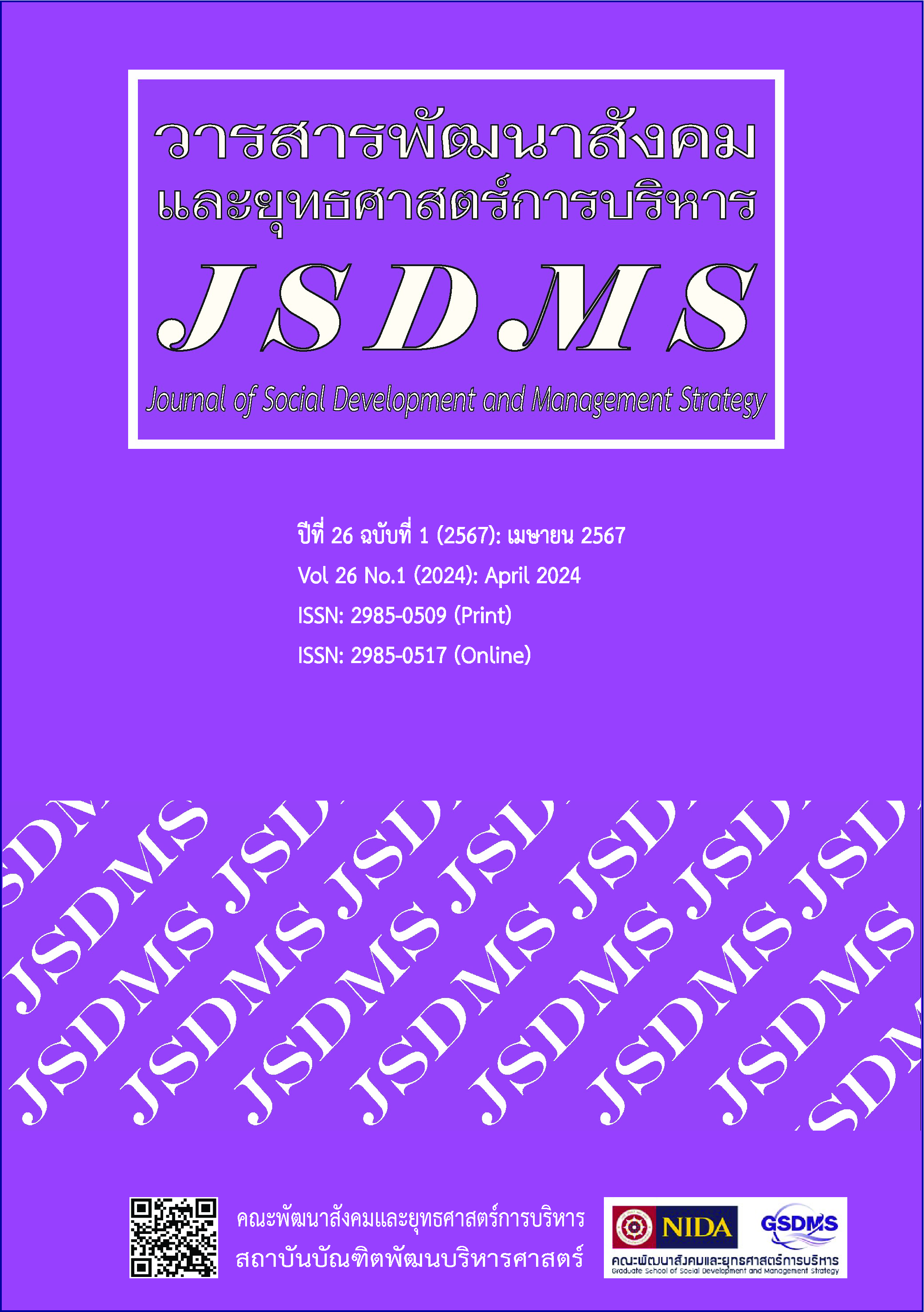Psychosocial Factors Related to Hygiene Behavior in Community of Secondary School Students
Main Article Content
Abstract
The research was a correlation comparative study using the conceptual framework of the interactionism model. This study aimed to identify significant predictors and risk groups related to hygiene behavior in the community to prevent COVID-19 illness among secondary school students. The sample chosen using multi-stage sampling method, consisted of 380 secondary school students. The instrument used to measure the variable was summated rating scales with reliability of .771-.952. Multiple regression analysis found that a total of nine variables, including of psychological traits, situational factors, and psychological states could predict 54.7% of the variance in community hygiene behavior in the overall group. The most important predictor was good attitude towards hygiene behavior, followed by readiness to perform hygiene behavior to prevent COVID-19 disease, and future orientation and self-control. The group at risk for hygiene behavior in the community was male students who should be urgently improved in terms of good attitudes towards hygiene behavior, seeing good examples from family, evaluating core self-evaluation, future orientation, and self-control, and being positively influenced by friends, respectively. The results of this research provided guidelines for promoting hygiene behavior in community of secondary school student. The research findings were utilized by the relevant agencies to provide guidelines for encouraging hygienic practices in the community for the purpose of preventing COVID-19 infections and as a basis for future investigations
Article Details

This work is licensed under a Creative Commons Attribution-NonCommercial-NoDerivatives 4.0 International License.
References
Anonglak Punpromthada. (2021). Predicting COVID-19 related preventive behaviors using three psycho-social models in undergraduate student [In Thai] (Unpublished doctoral dissertation). National Institute of Development Administration, Bangkok.
Benjaporn Praneetvatakul. (2017). Psychosocial as correlates of communicable disease preventive behavior in daily life of undergraduate students [In Thai] (Unpublished master’s thesis). National Institute of Development Administration, Bangkok.
Cohen, J. (1992). Statistical power analysis. Current Directions in Psychological Science, 1(3), 98-101.
Department of Disease Control. (2020). Information about how to protect yourself from the 2019 new coronavirus. Retrieved from https://ddc.moph.go.th/viralpneumonia/introduction.php
Duangkamol Promlukkano. (2006). Antecedent and consequences concerning student health behaviors of late adolescents in health promoting schools project [In Thai] (Unpublished master’s termpaper). National Institute of Development Administration, Bangkok.
Duchduen Bhanthumnavin. (2007). Interactionism model and guidelines to build a hypothesis of psychological behavior research in Thailand [In Thai]. Journal of Social Development, 9(1), 85-117.
Duchduen Bhanthumnavin. (2007). Sampling techniques in psycho-behavioral science [In Thai]. Journal of Social Development, 9(2), 118-148.
Duchduen Bhanthumnavin. (2015). Antecedents of readiness and potential to become researches in different types of individuals: graduate students. (Research Report) [In Thai]. Bangkok: National Institute of Development Administration.
Duchduen Bhanthumnavin. (2017). Research for development and validation of research moral disengagement [In Thai]. Journal of Behavioral Science, 23(2), 117-138.
Judge, T. A., Erez, A., Bono, J. E., & Thoresen, C. J. (2003). The core self-evaluations scale: development of a measure. Personal Psychology, 56(2), 303-331.
Judge, T. A., Locke, E. & Durham, C. C. (1997). The dispositional causes of job satisfaction: A core evaluations approach. Research in Organizational Behavior, 19, 151-188.
Jukrapun Siriboriruk & Somjit Prueksaritanond. (2020). COVID-19 [In Thai]. Burapha Journal of Medicine, 7(1), 89-95.
Krisana Chotratanakamol, Duangduen Bhanthumnavin, Duchduen Bhanthumnavin, Kosol Meekun, Saran Pimthong, & Chaiyut Kleebbua. (2023). The nomological model of study-life balance in Thai university student [In Thai]. The Journal of Behavioral Science, 18(2), 116-135.
Kularp Saipopoo. (2003). Psycho-social correlates of hygienic behavior of junior high school students [In Thai] (Unpublished master’s termpaper). National Institute of Development Administration, Bangkok.
Magnusson, D. & Endler, N. S. (1977). Personality at the crossroad: Current issues in interactionism psychology. New Jersey: LEA.
Ministry of Public Health. (2022). Endemic approach to COVID-19. Retrieved from https://dmsic.moph.go.th/index/detail/8962
Naksit Sakdapat. (2021). Psychosocial factors related to the COVID-19 prevention behaviors of undergraduate students [In Thai]. Journal of Behavioral Science, 27(2), 39-62.
Notification by the Ministry of Public Health Concerning the Names and Presenting Symptoms of Dangerous Communicable Diseases (No.3) B.E. 2565. (2022, 20 September). Royal Thai Government Gazette. 139, 223D (Special part), 2.
Nutcha Ibrohem, Shuttawwee Sitsira-at, Vitanya Vanno, & Duchduen Bhanthumnavin. (2022). Psychosocial factors related to mindful risk-taking behaviors for consuming beauty supplements of early adulthood with overweight [In Thai]. Journal of Social Development and Management Strategy, 25(1), 42-80.
Rossanant Na Nagara. (2007). Integration psychological characteristics and situational factors as correlate of thrift behavior of junior highschoolers with bank in school [In Thai] (Unpublished master’s termpaper). National Institute of Development Administration, Bangkok.
Worapat Mekkhachorn. (2019). Psycho-social as correlates of college adaptive behavior in lower-level undergraduate students [In Thai] (Unpublished doctoral dissertation). National Institute of Development Administration, Bangkok.
Worapat Mekkhachorn, Duchduen Bhanthumnavin, Duangduen Bhanthumnavin, Kosol Meekun, Shuttawwee Sitsira-at, & Saran Pimthong. (2020). Psychosocial factors related to self-determination behavior in learning of undergraduate students [In Thai]. Journal of Behavioral Science for Development, 12(1), 74-91.
Yamane, T. (1976). Statistic: An introduction analysis (2nd ed.). New York: Harper and Row.
Yanan Chai-ardharn. (2014). Psycho-social factors contributing to teenage pregnancy behavior in Lop Buri province [In Thai] (Unpublished doctoral dissertation). National Institute of Development Administration, Bangkok.
Yaowalak Tiawilai. (2018). The psycho-social factors correlates of moral communications behavior focusing on social media of undergraduate students [In Thai] (Unpublished master’s thesis). National Institute of Development Administration, Bangkok.


